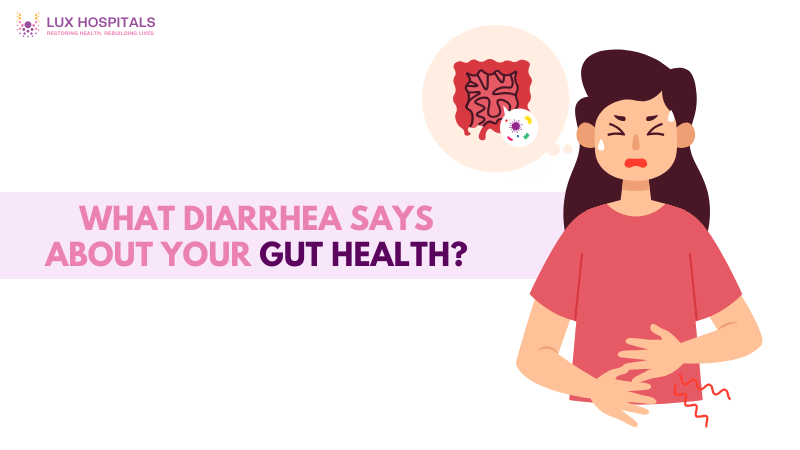What Diarrhea Says About Your Gut Health: The Role of the Microbiome

Diarrhea. It’s not something we usually bring up in conversations, but it’s one of the most telling signs of what’s going on inside your body particularly your gut health. Whether it hits suddenly after eating something questionable or lingers due to stress or illness, diarrhea is your gut’s way of sounding the alarm.
Your gut health relies on a vast community of bacteria, viruses, and fungi—collectively known as the gut microbiome. When this delicate ecosystem is disrupted, it often results in symptoms like diarrhea, bloating, or abdominal pain. In this blog, we’ll explore the strong link between diarrhea and your gut health, discuss common diarrhea symptoms, and offer tips for effective diarrhea treatment.
Understanding Diarrhea and Its Causes
Frequent, loose, or watery feces are referred to as diarrhea. Depending on the underlying reason, it may be a temporary or long-lasting problem. The majority of cases are benign and go away quickly, but severe or ongoing diarrhea could indicate more serious issues with your digestive system.
Common Causes of Diarrhea:
- Infections (bacterial, viral, or parasitic)
- Food intolerances (like lactose or gluten)
- Medication side effects (especially antibiotics)
- Stress and anxiety
- Chronic digestive conditions
- Imbalance in the gut microbiome
Medications like antibiotics can disrupt gut health by killing not just harmful bacteria, but also the beneficial ones that maintain balance in your digestive system. This often leads to diarrhea.
The Gut Microbiome: The Core of Your Gut Health
Your gut health is anchored in the diversity and balance of your gut microbiome. This ecosystem supports digestion, nutrient absorption, immune function, and mood regulation. When it becomes imbalanced—a condition known as dysbiosis—your digestive system may react through symptoms like diarrhea.
Signs of Poor Gut Health:
- Frequent diarrhea
- Bloating or gas
- Food sensitivities
- Fatigue
- Brain fog
- Weakened immunity
If you constantly experience diarrhea symptoms, it’s a red flag that your gut health needs attention.
Types of Diarrhea and What They Indicate About Gut Health
Not every type of diarrhea is the same. You can enhance your gut health and identify the cause of your diarrhea by knowing what kind it is.
1. Osmotic Diarrhea
Caused by water being drawn into the bowel by poorly absorbed chemicals in the colon. frequently linked to poor gut health and dietary intolerances.
2. Secretory Diarrhea
Triggered by infections or toxins that cause the gut to secrete excess fluids. A sign that your gut microbiome is under attack.
3. Inflammatory Diarrhea
Linked to conditions like IBD or infections that cause inflammation and damage in the gut again reflecting compromised gut health.
Each type of diarrhea offers clues about the state of your digestive system.
When to Worry About Diarrhea?
While most cases of diarrhea are short-lived, it’s important to seek medical attention if:
- It lasts longer than three days
- You have signs of dehydration.
- There’s blood or mucus in your stool.
- You experience weight loss or fever.
- You’re feeling unusually fatigued.
These may indicate severe disruptions in your gut health or other underlying conditions.
Diarrhea Treatment: How to Heal Your Gut
Effective diarrhea treatment depends on the cause, but the goal is always the same—restore and protect your gut health. Here are some proven strategies:
1. Rehydrate
Diarrhea depletes fluids quickly. Drink plenty of water, oral rehydration solutions, or electrolyte-rich beverages.
2. Eat Gut-Friendly Foods
Focus on the BRAT diet (bananas, rice, applesauce, toast) and gradually introduce fiber and fermented foods like yogurt to support your gut microbiome.
3. Take Probiotics
These supplements can help restore the balance in your gut, especially after antibiotic use or illness. They support long-term gut health and reduce diarrhea symptoms.
4. Avoid Trigger Foods
Limit spicy, greasy, or dairy-heavy meals. These can worsen diarrhea and irritate your gut lining, further damaging gut health.
5. Use Medications Cautiously
Over-the-counter anti-diarrheal medications like loperamide can provide temporary relief but should not be used without understanding the root cause—especially if the diarrhea is infection-related.
How to Maintain Gut Health Long-Term?
Once you’ve resolved your diarrhea, focus on rebuilding and protecting your gut health. Here are everyday tips to keep your microbiome happy:
- Eat a high-fiber, plant-based diet.
- Incorporate fermented foods like kimchi, yoghurt, and kefir.
- Avoid unnecessary antibiotics
- Exercise regularly
- Manage stress through mindfulness or therapy.
- Get enough sleep
- Stay hydrated
In addition to preventing diarrhea, gut health improves immunity, balances mood, and promotes general wellness.
Conclusion
While uncomfortable, diarrhea is often your body’s way of letting you know your gut health is out of sync. The message is clear whether it’s due to infection, food intolerance, or chronic illness—your gut needs care.
Understanding the relationship between diarrhea and gut health allows you to take a more proactive approach. You can restore balance and feel better faster with the proper diet, lifestyle, and possibly probiotics.
Frequently Asked Questions
Diarrhea often signals that your gut health is out of balance. It may be due to infections, poor diet, stress, or disruptions in your gut microbiome, which can affect digestion.
Diarrhea symptoms include loose or watery stools, abdominal cramps, bloating, urgency to use the toilet, and sometimes nausea. Severe cases may involve dehydration or fever.
Stay hydrated, eat a bland diet, and include probiotic-rich foods like yogurt to restore your gut health. Avoid processed or greasy foods, and focus on rest and stress management.
If diarrhea lasts more than three days, includes blood, causes dehydration, or is accompanied by severe pain or high fever, you should see a doctor, as it may reflect a serious gut issue.
Not always. While infections are common causes, diarrhea can also be triggered by food intolerance, medications, or poor gut health due to imbalance in the gut microbiome.
The best diarrhea treatment includes drinking fluids with electrolytes, eating bland foods, avoiding caffeine and dairy, and using probiotics to support gut recovery.
Stress impacts gut health by disrupting digestion and the gut microbiome, which can trigger or worsen diarrhea. Managing stress helps maintain a healthier digestive system.
Yes, persistent diarrhea can result from poor gut health. An unbalanced gut microbiome is frequently the source of conditions like IBS or IBD, which can result in persistent digestive problems.
Probiotics are beneficial for diarrhea treatment, especially after antibiotics. They help restore gut bacteria and improve overall gut health, reducing symptoms faster.
During diarrhea, eat bananas, rice, applesauce, and toast. Avoid spicy, fatty, or dairy-heavy foods. These choices help ease diarrhea symptoms and support gut health recovery.




















